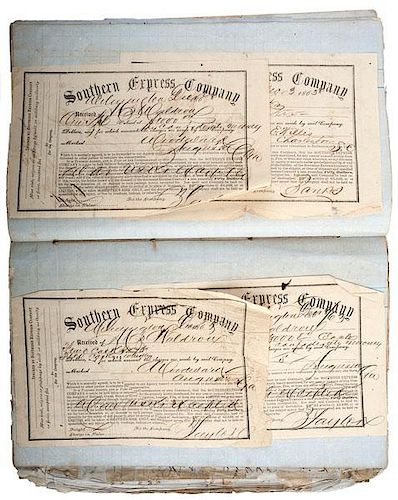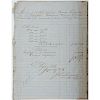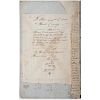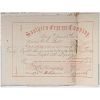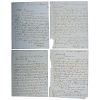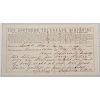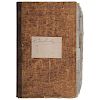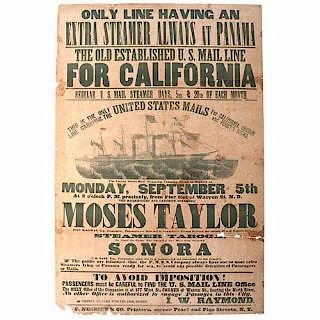Civil War Letterbook of Edward Willis, Commission Merchant at Charleston, SC, Relating to the Blockade
About Seller
6270 Este Ave.
Cincinnati , OH 45232
United States
With offices in Cincinnati, Cleveland and Denver, Cowan’s holds over 40 auctions each year, with annual sales exceeding $16M. We reach buyers around the globe, and take pride in our reputation for integrity, customer service and great results. A full-service house, Cowan’s Auctions specializes in Am...Read more
Two ways to bid:
- Leave a max absentee bid and the platform will bid on your behalf up to your maximum bid during the live auction.
- Bid live during the auction and your bids will be submitted real-time to the auctioneer.
Bid Increments
| Price | Bid Increment |
|---|---|
| $0 | $25 |
| $500 | $50 |
| $1,000 | $100 |
| $2,000 | $250 |
| $5,000 | $500 |
| $10,000 | $1,000 |
| $20,000 | $2,500 |
| $50,000 | $5,000 |
| $100,000 | $10,000 |
About Auction
Jun 10, 2016 - Jun 11, 2016
Cowan's Auctions dawnie@cowans.com
- Lot Description
Civil War Letterbook of Edward Willis, Commission Merchant at Charleston, SC, Relating to the Blockade
Letterbook and 4 letters.
John Linnaeus Edward Willis (1854-1906), known as Edward Willis as an adult, was a Charleston native. He was born and died in that Southern city, although he lived in Augusta, GA for much of his childhood, returning to Charleston after the death of his father. There he began working for John Frasier & Co.
When war erupted, in 1861, he received an appointment as quartermaster with the rank of Major, having experience as a merchant. He served as Chief Quartermaster on General P.G.T. Beauregard's staff, in part Beauregard was commanding the Charleston defenses when he fired on Fort Sumter in the harbor. He then became chief purchasing agent for the Confederate government, where a large part of his duties involved purchasing blockade goods.
This lot includes 4 letters and a letterbook in which Willis affixed various notes, letters, telegrams and receipts. The letterbook is 8 x 13 in. with light cardstock covers with marbled paper and a cloth spine. On front cover is a 3 x 4 in. slip labeled simply "Blockade." There are only a few original pages remaining, and only about a few have any notes on them. There are about 40 items in the letterbook, most without dates, but those with dates are for the most part from 1862 and 1863. There are just a couple of items later (1867). The first item inside the cover contains instructions on how to convert British currency to US (Confederate) currency (i.e., pounds to dollars). There are eight receipts from Southern Express Company from Dec. 1862 to March 1864, and three Southern Telegraph Company message slips, all apparently referring to purchase of bonds. Many of the items are addressed to "Major Willis."
Two of the letters are from Wm. Foga, New Orleans, dated the 14th and 20th of Sept. 1861. These primarily contain prices of items needed - cloth, coffee, rice, candles. But other information is included, as well. In the earlier he notes: "These is a report of Spains having acknowledged our Flag, but it comes in such a confused form that I am afraid to place much faith in it, but I nevertheless hope it is true. We are expecting an attack here next month, & I regret to say our authorities are by no means as energetic as they might be." In the second he prefaces his prices by noting: "The suspension of specie payments by our Banks, & the adoption of Treasury notes as our Currency has caused an advance in almost all descriptions of merchandize." Inflation begins.... Also shortages - "Coffee none here."
A letter dated Sept. 23, 1861 is clearly from a friend, who addresses it "Dear Ned." He is in Morehead City [NC], and gives his opinion of the Union. "I suppose you all imagine that we are to sea by this time, and my only regret is that we are not. The "Rail splitting" Thief has the port so well blockaded that there is not the slightest possible chance of our getting out without being captured. If they would only give me a chance to get beyond their limits and then take me I would willingly spend a few months in Fort Layfaette [sic] then I think England would act and bring the Pirates at Washington to some kind of reason. dont you wish you was a John Bull [English]. Bye the bye does it require me do or say anything to become a citizen of the Southern Confederacy? I have sailed from Charleston for twenty three years - my family would have moved there could they have got my letter in time, and I swear I wont belong north. if you wont have me I will turn John Bull. do attend to it for me for I feel as if I had no home if Charleston casts me off. There was six of Lincolns vessels anchored off the Fort this evening which has created quite an excitement. The Fort is well garrisoned and in good order but the folks about here is mighty scary and none too loyal. When you come here you wont find South Carolina. I was very much pleased to hear that "session" dodged the Philistines and arrived safe, remember me to him. Lafitte is going to send my letter box to JF & Co. will you take charge of it. It contains all my letters both public and private. ... Yours sincerly [sic] S. De Forest
The last letter is from Savannah, 3 Oct. 1861. It appears to be from a close business associate who tells Willis that 40 boxes are on their way. "I would come home to Charleston today, but there is a Schooner reported arrived at Sappello with an assorted cargo from Liverpool. I also await the arrival of the Robt. Peel in case Messrs John Fraser & Co. may want me to Ship any of the cargo. It is a good thing that those 40 cases are gone from here my impression is that they would be seized or taken by force by the Georgians. The Confederate States agent Capt Childs was shipping his goods untill seven oclock last evening. ... Please be kind enough to telegraph me tomorrow before the train leaves for Charleston. If Mr. Wagner want[s] me to remain to ship any of the cargo of the Robert Peel. Very truly, John Snowey(?)
A snapshot into the South beginning to cope with a "new reality" - the blockade intended to cut off their food, ammunition and arms, trade (especially cotton), etc. in hopes of bringing a quick end to the war.
Also included is a letter from the South Carolina Historical Society thanking the owner for lending this letterbook to them to duplicate along with a copy of the microfiche.
Provenance: The M. Clifford (Cliff) and Lynne B. Young Confederate Blockade Runner CollectionLetters all have sections of paper torn from them (where it was blank - paper became scarce and any scrap would work as a receipt). Overall the paper is good, with light edge toning and expected folds. The items in the letterbook have more extensive toning, some tape and glue residue, edge scuffing (especially where they extend beyond the covers of the book), but they are for the most part very readable, as the damage does not much impact the text area.Condition
- Shipping Info
-
SHIPPING. At the request of the buyer, Cowan's will authorize the shipment of purchased items. Shipments usually occur within two weeks after payment has been received. Shipment is generally made via UPS Ground service. Unless buyer gives special instructions, the shipping method shall be at the sole discretion of Cowan's Auctions, Inc.. Cowan's is in no way responsible for the acts or omissions of independent handlers, packers or shippers of purchased items or for any loss, damage or delay from the packing or shipping of any property.
-
- Buyer's Premium



 EUR
EUR CAD
CAD AUD
AUD GBP
GBP MXN
MXN HKD
HKD CNY
CNY MYR
MYR SEK
SEK SGD
SGD CHF
CHF THB
THB